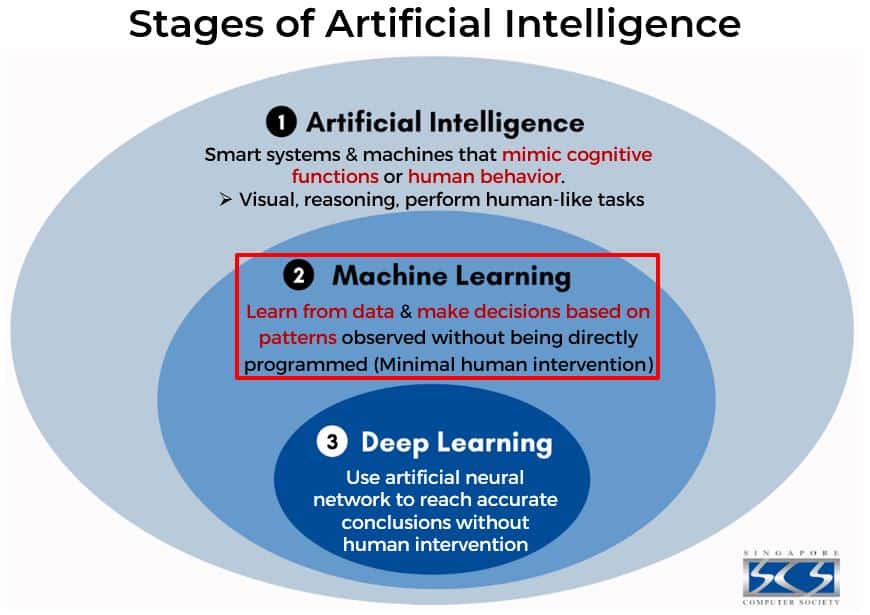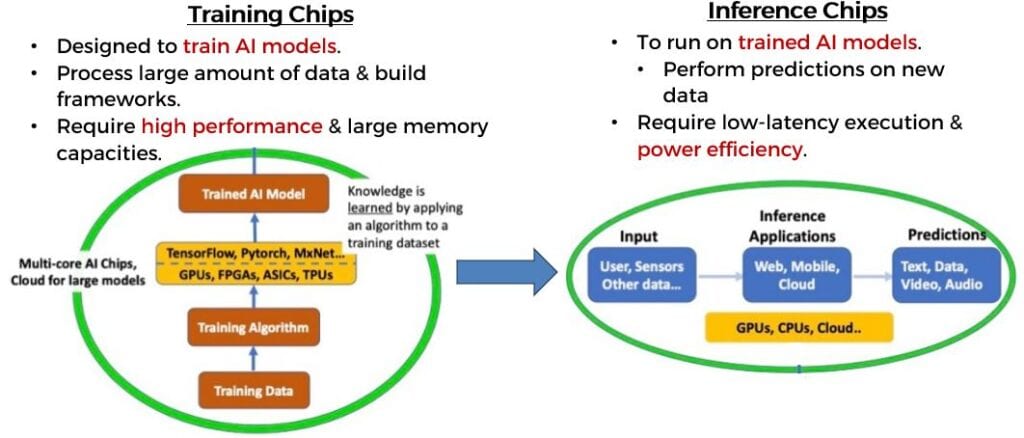Artificial Intelligence (AI) has emerged as a transformative technology that is reshaping industries, enhancing user experiences, and redefining the boundaries of what machines can achieve. One of the driving forces behind the rapid progress in AI is the development of specialized hardware, often referred to as AI chips.
These chips are designed to accelerate AI computations, making complex tasks possible at unprecedented speeds. Apart from the well-known CPU and GPU, various types of semiconductor chips play a pivotal role in advancing AI.
In this article, we’ll delve into the stages of AI, the machine learning workflow, and the different types of AI chips and their applications.
STAGES OF AI
The evolution of AI can be categorized into several stages, each marked by significant advancements in technology and capabilities:

- Artificial Intelligence: At this stage, machines achieve human-like intelligence, comprehending, learning, and applying knowledge across various tasks.
- Machine Learning: In this phase, AI learns from data and makes decisions based on patterns with minimal human input.
- Deep Learning: AI advances autonomously at this stage, attaining accurate outcomes and rapidly enhancing its capabilities without human intervention.
In this article, we’ll explore machine learning’s crucial role in designing AI chips that expedite the creation of AI models.
MACHINE LEARNING WORKFLOW
Machine learning is a subset of AI, aiming to help systems learn from data and enhance their performance progressively. AI chips are divided into two types for the machine learning process:
- Training Chips – Used to teach AI models from training data.
- Inference Chips – Deployed for running applications or predictions using trained AI models.

Training Chips & Inference Chips
TYPES OF AI CHIPS
AI chips, also known as AI accelerators or hardware accelerators, are designed to execute AI computations efficiently. They are optimized for the computational demands of machine learning tasks, making them significantly faster than traditional CPUs and GPUs.
There are several types of AI chips:

- Central Processing Units (CPUs): The “brain” of a computer that executes instructions and performs calculations for various tasks.
- Graphics Processing Units (GPUs): Initially designed for rendering graphics, GPUs are highly parallel processors that excel at training and running neural networks. They are widely used in deep learning applications, making them ideal to train AI models.
- Field-Programmable Gate Arrays (FPGAs): FPGAs are hardware devices that can be reconfigured after manufacturing. This flexibility makes them suitable for specialized tasks, rapid prototyping and inference on trained AI-models.
- Application-Specific Integrated Circuits (ASICs): ASICs are custom-designed chips optimized for specific applications. They offer high performance and energy efficiency, making them ideal for AI-related tasks.
There are also other types of AI chips for different applications:
- Tensor Processing Units (TPUs): TPUs, developed by Google, are specifically designed for neural network operations. They provide impressive acceleration for AI workloads while being power-efficient.
- Neuromorphic Chips: These chips are inspired by the human brain’s architecture and are designed to mimic its neural processing capabilities. They hold promise for energy-efficient AI.
APPLICATION OF AI CHIPS
The applications of trained AI chips are vast and span across various industries, for example:
Healthcare: AI chips can accelerate medical image analysis, assist in drug discovery, and enable real-time patient monitoring.
Autonomous Vehicles: AI chips power the perception and decision-making systems of self-driving cars, enabling them to navigate safely.
Finance: AI chips facilitate fraud detection, algorithmic trading, and credit risk assessment in the financial sector.
Manufacturing: They enhance quality control, predictive maintenance, and robotics in manufacturing processes.
Natural Language Processing: AI chips enable language translation, sentiment analysis, and chatbot interactions.
Scientific Research: AI chips contribute to simulations, data analysis, and modeling in scientific research fields.
CONCLUSION
In conclusion, AI chips have become the driving force behind the rapid advancements in artificial intelligence. With their ability to accelerate complex computations and handle massive amounts of data, these chips are shaping the future of technology across industries.
As AI continues to evolve, we can expect even more specialized and efficient AI chips to emerge, pushing the boundaries of what’s possible and opening up new opportunities for innovation.
We have also covered a few AI chip companies in our YouTube Channel and blog articles.
Click on the link below to find out more!
If you’ve ever had the desire to actively engage in your investment journey, acquire skills in company analysis, and construct your own portfolio from scratch, join us in our masterclass by clicking on the banner below to learn more how to:
- Generate 3 Sources of Passive Income even if you know Nothing about investing.
- Invest with minimal capital.
- Create a Cash Dispensing Machine to replace your existing salary.
DISCLOSURE
The above article is for educational purposes only. Under no circumstances does any information provided in the article represent a recommendation to buy, sell or hold any stocks/asset. In no event shall ViA or any Author be liable to any viewers, guests or third party for any damages of any kind arising out of the use of any content shared here including, without limitation, use of such content outside of its intended purpose of investor education, and any investment losses, lost profits, lost opportunity, special, incidental, indirect, consequential or punitive damages resulting from such unintended use.














